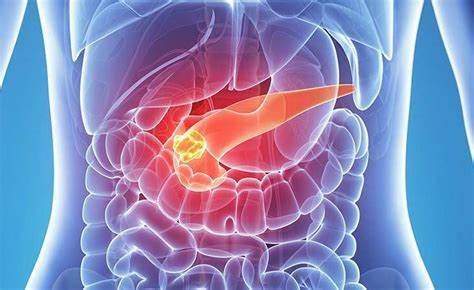AIM ImmunoTech Initiates Phase 1b/2 Trial for Ampligen® and AstraZeneca's Imfinzi® in Late-Stage Pancreatic Cancer
23 January 2024 | Tuesday | News

Image Source : Public Domain
AIM ImmunoTech Inc. announced that the first subject has been enrolled at Erasmus Medical Center in a Phase 1b/2 clinical trial combining AIM’s Ampligen® (rintatolimod) with AstraZeneca’s anti-PD-L1 immune checkpoint inhibitor Imfinzi® (durvalumab) for the treatment of late-stage pancreatic cancer (the “DURIPANC Study”).
Data strongly suggests Ampligen has therapeutic synergy when combined with checkpoint inhibitors — potentially increasing cancer treatment efficacy and subject survival rates. A successful DURIPANC Study could make AIM an especially attractive partnership or buyout target for Big Pharma. Data already strongly suggests that Ampligen synergistically enhances anti-PD-1 therapy. Strong positive clinical data from the DURIPANC study would also support our belief that Ampligen could synergistically enhance anti-PD-L1 therapies. Such broad-spectrum success could create value. AIM recently took an important step to secure potential stockholder value when it received a U.S. patent for the use of Ampligen as part of a combination therapy with an anti-PD-L1 antibody, which is an immune checkpoint inhibitor that helps the body attack tumor cells.
The DURIPANC Study is an investigator-initiated, exploratory, open-label, single-center study with the full name “Combining anti-PD-L1 immune checkpoint inhibitor durvalumab with TLR-3 agonist rintatolimod in patients with metastatic pancreatic ductal adenocarcinoma for therapy effect.” The primary objective of the Phase 1b portion is to determine the safety of combination therapy with Imfinzi and Ampligen. The primary objective of the Phase 2 portion is to determine the clinical benefit rate of the combination therapy.
“We expect to complete the Phase 1b portion of the study within six months,” states Prof. Casper H.J. van Eijck, MD, PhD, the DURIPANC Study’s Coordinating Investigator.
AIM CEO Thomas K. Equels stated: “Ampligen’s potential as part of a combination therapy is a relatively simple equation. One, elevated PD-L1 expression — which is known to occur in pancreatic cancer — has been associated with increased exhaustion of peripheral and intra-tumoral cytotoxic T cells, commonly called ‘killer’ T cells. Two, data indicate that Ampligen has the potential to mitigate T cell exhaustion. Three, Ampligen can increase the number and activity of immune cells in the blood and tumor. And four, Imfinzi inhibits PD-L1 activity, thereby making those activated immune cells in the tumor microenvironment more effective at fighting the cancerous tumor. Data from our Dutch Early Access Program strongly supports Ampligen’s potential to increase progression-free survival and overall survival. Our hope for the DURIPANC trial is that at a minimum we see an even longer period of stable disease, also called progression-free survival. However, we also believe this combination of drugs has the potential to decrease tumor size or even to cure the cancer, which is defined as being tumor free for at least five years. That would be a dramatic breakthrough in the treatment of a highly lethal and treatment-resistant human cancer.”
The study is expected to enroll up to 18 subjects in its Phase 1b portion and up to 25 subjects in its Phase 2 portion. Subjects will start with Ampligen 200 mg via IV infusion twice per week for a total of 6 weeks (12 doses). Ampligen dose will be escalated to 400 mg according to a 3+3 DLT design. The first dose of Ampligen will be administered preferably 4-6 weeks after the last chemotherapy FOLFIRINOX dose. After two doses of Ampligen, the first dose of durvalumab 1500 mg via IV infusion will be introduced in week 2. Patients will continue to receive 1500 mg durvalumab via IV infusion every 4 weeks for up to a maximum of 48 weeks (up to 12 doses/cycles) with the last administration on week 48 or until confirmed disease progression according to Response Evaluation Criteria in solid Tumors (RECIST 1.1), unless there is unacceptable toxicity, withdrawal of consent, or another discontinuation criterion is met.
Most Read
- How Does GLP-1 Work?
- Innovations In Magnetic Resonance Imaging Introduced By United Imaging
- Management of Relapsed/Refractory Multiple Myeloma
- 2025 Drug Approvals, Decoded: What Every Biopharma Leader Needs to Know
- BioPharma Manufacturing Resilience: Lessons From Capacity Expansion and Supply Chain Resets from 2025
- APAC Biopharma Review 2025: Innovation, Investment, and Influence on the Global Stage
- Top 25 Biotech Innovations Redefining Health And Planet In 2025
- The New AI Gold Rush: Western Pharma’s Billion-Dollar Bet on Chinese Biotech
- Single-Use Systems Are Rewiring Biopharma Manufacturing
- The State of Biotech and Life Science Jobs in Asia Pacific – 2025
- Asia-Pacific Leads the Charge: Latest Global BioSupplier Technologies of 2025
- Invisible Threats, Visible Risks: How the Nitrosamine Crisis Reshaped Asia’s Pharmaceutical Quality Landscape
Bio Jobs
- Sanofi Turns The Page As Belén Garijo Steps In And Paul Hudson Steps Out
- Global Survey Reveals Nearly 40% of Employees Facing Fertility Challenges Consider Leaving Their Jobs
- BioMed X and AbbVie Begin Global Search for Bold Neuroscience Talent To Decode the Biology of Anhedonia
- Thermo Fisher Expands Bengaluru R&D Centre to Advance Antibody Innovation and Strengthen India’s Life Sciences Ecosystem
- Accord Plasma (Intas Group) Acquires Prothya Biosolutions to Expand Global Plasma Capabilities
- ACG Announces $200 Million Investment to Establish First U.S. Capsule Manufacturing Facility in Atlanta
- AstraZeneca Invests $4.5 Billion to Build Advanced Manufacturing Facility in Virginia, Expanding U.S. Medicine Production
News











